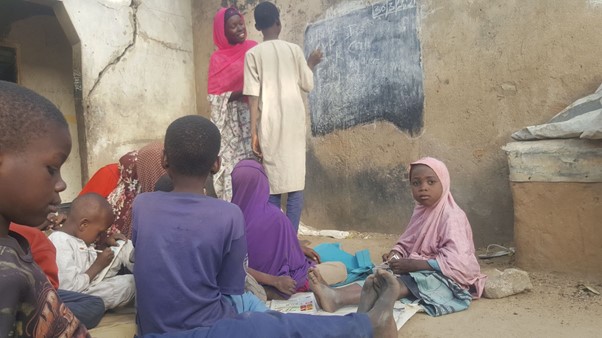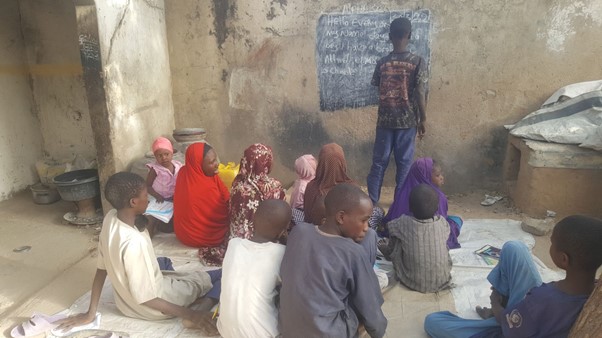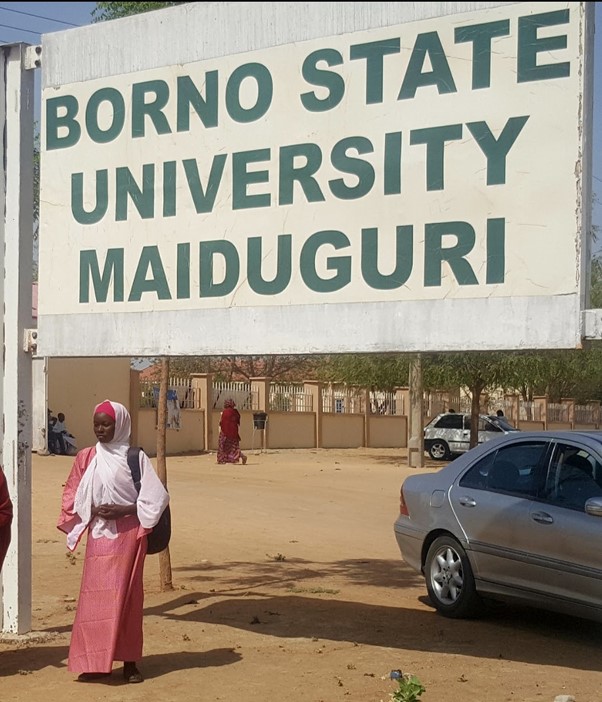Zarah: How Boko Haram Escapee Fills Teaching Void In Borno
She had escaped Boko Haram’s clutches where she was to be forcefully married. Now she desires to build a “community of champions” through her teaching initiative, particularly for children in Internally Displaced Persons (IDP) camps.

After school hours, most evenings, 19-year-old Zarah Mohammed teaches the out-of-school children around her community in Dala-Alamderi, Maiduguri, Borno State, Northeast Nigeria.
Zarah has escaped multiple attempts by Boko Haram to force her into marriage as a child. Since regaining her freedom, she has prioritised education for herself and others. Her current drive is captured in these words: “My dream for the future is to see my people, especially the younger ones, get quality education which I’m told in school is the key that unlocks the chain of poverty and illiteracy; the very reason I struggle to go to school.”
The trigger
Reports have shown that, “between 2013 and 2017, armed assailants claiming or believed to be part of Boko Haram regularly targeted individual students, teachers, and other education personnel in isolated or coordinated incidents, which often took place at schools. They shot, killed, abducted, threatened teachers and students. Attacks on students and teachers occurred with greater frequency from 2013 to 2017 than from 2009 to 2013.”
This makes Zarah’s intervention timely and significant.
Making use of a rough wall painted with charcoal as an instruction chalkboard, Zarah teaches children alphabets and words, from their position on the floor.
The children, mostly orphans and wards of IDPs living in host communities, learn to identify and pronounce words, and even solve basic arithmetic problems.
“I want to help my people to overcome illiteracy at all cost, ” Zarah told HumAngle. “We are very poor because we are not educated. And sadly, this lack has pushed many of our younger ones into crimes like Boko Haram.”
“Wth my secondary education and my ability to read and write, my people are very proud of me; they see me as their champion. But I do not want to be their only champion. I want to build a community of champions who would in turn help others.”

“In my case, if not for UNICEF’s help, I would have missed my opportunity by now. I hope my siblings and younger ones around me don’t miss theirs. That’s why I organise free evening lessons to kindle the kids’ interest in going to school.”
Zarah and the children use improvised chalks from a broken brick of Plaster of Paris (POP) on their chalkboard.
The Borno State government has built several structures as modern classrooms in various parts of Maiduguri but parents in Dala-Alamdari, where Zarah lives, said they could not get their children enrolled into those schools.
Why it matters
“We want our children to learn and be educated just like other children in school but our major challenge is lack of money to buy them uniforms and books as well as pay some of the levies,” said Hafsat Muhammed, an aunt to Zarah.
The Borno State government recently established a “mega” school in Bulumkutu, not far away from Dala-Alamdari, where some of the displaced children and orphans are enrolled free of charge. But it turns out not all children have access to the public school.
“The primary school here in Dala charges money and we are too poor to afford the school fees,” said Ms Hafsat. “As you can see we don’t even have enough to eat, talk more of paying for the children’s education. And when we went to the mega school meant for the IDPs, we were told that space is filled up. So, we have no choice but to let the children sit idle at home.”
Ms Hafsat, a mother of five, said none of her children had ever enrolled in school or know how to read until Zarah started the evening classes for the children in their neighbourhood.
“I am not educated, but I am happy that Zarah is helping our children to have a feel of what it is to read and write and somehow speak the language of the educated people. I am very hopeful that this little effort of Zarah’s would be a stepping stone for our children to be qualified for enrolment into conventional classes. We want the government to see through these little efforts how life is difficult for us living in the host communities,” she said.
Zarah’s education does not come easy too
Zarah got the opportunity to further her studies when the Borno State government, through the Bama local government council, announced free admission for indigent students of Bama who were affected by the Boko Haram conflict.

An automatic admission was given to selected beneficiaries by the management of the University in October 2020 which enabled them commence a remedial programme. But the government failed to pay the students’ tuition as expected.
To secure a place in the university, Zarah needed to take the Joint Admission and Matriculation Board (JAMB) exams, which she later did.
Currently, Zara, who was able to complete her secondary school education through UNICEF’s support, is pursuing a remedial programme at Borno State University, Maiduguri where she hopes to study computer science.
Support Our Journalism
There are millions of ordinary people affected by conflict in Africa whose stories are missing in the mainstream media. HumAngle is determined to tell those challenging and under-reported stories, hoping that the people impacted by these conflicts will find the safety and security they deserve.
To ensure that we continue to provide public service coverage, we have a small favour to ask you. We want you to be part of our journalistic endeavour by contributing a token to us.
Your donation will further promote a robust, free, and independent media.
Donate HereStay Closer To The Stories That Matter




